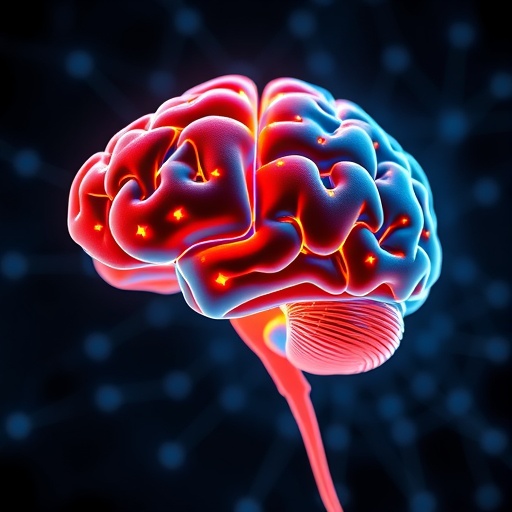In a groundbreaking study poised to deepen our understanding of antidepressant mechanisms, researchers have unveiled new insights into how escitalopram—a selective serotonin reuptake inhibitor (SSRI)—modulates reinforcement learning processes in the human brain. This work, emerging from a rigorously designed double-blind, placebo-controlled semi-randomised trial, intricately combines computational modeling with neural imaging to dissect the cognitive and neurobiological underpinnings of reinforcement learning following a three-week course of escitalopram. The findings hold profound implications for psychiatric treatment optimization, advancing the frontier of precision medicine in neuropsychiatry.
Reinforcement learning, a fundamental cognitive function enabling organisms to adapt behavior based on rewards and punishments, operates via complex neural circuits primarily involving the prefrontal cortex and the striatum. By systematically studying changes in these circuits under pharmacological influence, the current research bridges the gap between molecular action of SSRIs and their emergent behavioral effects. Traditionally, SSRIs like escitalopram are prescribed to alleviate symptoms of depression by enhancing serotonergic neurotransmission; however, the precise ways this biochemical modulation translates into cognitive and learning adaptations have remained elusive until now.
The research team employed an innovative computational modeling framework to characterize alterations in reinforcement learning parameters amid escitalopram treatment. This approach transcended superficial behavioral assessment, delving into latent learning dynamics such as prediction error signaling and value updating. By comparing computational signatures pre- and post-intervention, the study delineated how serotonin reuptake inhibition subtly recalibrates the balance between learning from positive versus negative outcomes, an essential aspect of adaptive decision-making.
Neuroimaging data acquired through functional MRI provided a complementary neural perspective. Participants underwent scanning sessions synchronized with reinforcement learning tasks before and after the administration of escitalopram or placebo. The high-resolution imaging allowed researchers to identify specific brain regions where activity correlated with computational model parameters. Intriguingly, escitalopram was found to modulate activation patterns notably in the ventral striatum and dorsal anterior cingulate cortex—areas critically implicated in reward processing and cognitive control.
One of the study’s most compelling revelations was the shift in neural correlates of prediction errors, which are signals reflecting the difference between expected and actual outcomes. Under escitalopram, participants exhibited enhanced striatal prediction error responses to rewards, suggesting an increased sensitivity to positive reinforcement. This contrasts with the relatively blunted responses observed in the placebo group, offering empirical evidence that serotonergic modulation can fine-tune reward learning pathways at the neural circuitry level.
Beyond neuroscientific insights, these findings resonate clinically, suggesting that escitalopram’s therapeutic effects may stem not only from mood elevation but also from improved learning flexibility and adaptation. Depression often features maladaptive reinforcement learning biases, such as diminished response to reward and excessive sensitivity to punishment. By partially restoring these neural and cognitive processes, SSRIs might facilitate more effective engagement with environmental stimuli, fostering healthier behavioral responses.
The semi-randomised design of the study strengthened the robustness of conclusions by balancing allocation probabilities and minimizing confounding biases. Enrolling a sufficiently large and demographically diverse cohort, the investigation ensured that observed effects were attributable to the pharmacological intervention rather than extraneous factors. Moreover, the double-blind protocol preserved scientific rigor, preventing expectancy effects from skewing participant performance or neural measures.
The computational models utilized incorporated elements from contemporary reinforcement learning theories, integrating parameters like learning rates, exploration-exploitation trade-offs, and reward sensitivity. Such granularity allows for a nuanced understanding of individual differences in treatment response, opening avenues for personalized psychiatry where medication regimens could be tailored based on specific cognitive profiles revealed through modeling.
Neural data analysis leveraged advanced statistical techniques including parametric modulation and region-of-interest testing, ensuring that observed activation changes were both statistically significant and biologically meaningful. The ventral striatum’s heightened activity post-escitalopram aligns with existing literature implicating this region in processing rewarding stimuli, reinforcing the mechanistic link between serotonin function and motivational states.
Interestingly, the dorsal anterior cingulate cortex manifested altered responses related to conflict monitoring and error detection, suggesting that escitalopram might enhance executive functions essential for flexible behavioral adaptation. This dual impact on both reward valuation and cognitive control circuits underlines the multifaceted influence of SSRIs beyond their conventional mood-stabilizing roles.
The study also raises questions about temporal dynamics of antidepressant efficacy. Observing neural and behavioral changes after just three weeks signals that notable cognitive modulation occurs relatively early in treatment, potentially preceding or paralleling symptomatic improvement. This temporal insight might guide future clinical protocols toward integrating cognitive assessments as early biomarkers of therapeutic response.
Furthermore, these results offer fertile ground for exploring synergistic treatments combining pharmacology with cognitive training. If escitalopram enhances learning capacity, structured behavioral interventions during this window could capitalize on heightened neuroplasticity, accelerating recovery trajectories for patients with depression or anxiety disorders.
Despite its strengths, the research acknowledges limitations, including the challenge of disentangling direct drug effects from placebo-related expectancy and the complexity of generalizing findings across diverse psychiatric populations. Future investigations employing longitudinal designs and multimodal imaging could expand understanding of sustained neurocognitive changes underlying long-term antidepressant efficacy.
In conclusion, this pioneering study elegantly fuses computational neuroscience and clinical psychiatry, revealing that escitalopram treatment recalibrates reinforcement learning both behaviorally and neurally. By mapping these intricate changes, it charts a path toward more effective, personalized treatment strategies for mood disorders, harnessing the power of brain-informed computational tools to revolutionize mental health care. As the burden of depression continues to escalate globally, such innovative research offers hope for interventions that not only alleviate symptoms but also restore fundamental cognitive processes essential for adaptive living.
Subject of Research:
Article Title:
Article References: Langley, C., Murray, G.K., Armand, S. et al. Computational modelling and neural correlates of reinforcement learning following three-week escitalopram: a double-blind, placebo-controlled semi-randomised study. Transl Psychiatry 15, 175 (2025). https://doi.org/10.1038/s41398-025-03392-6
Image Credits: AI Generated
DOI: https://doi.org/10.1038/s41398-025-03392-6
Keywords:




